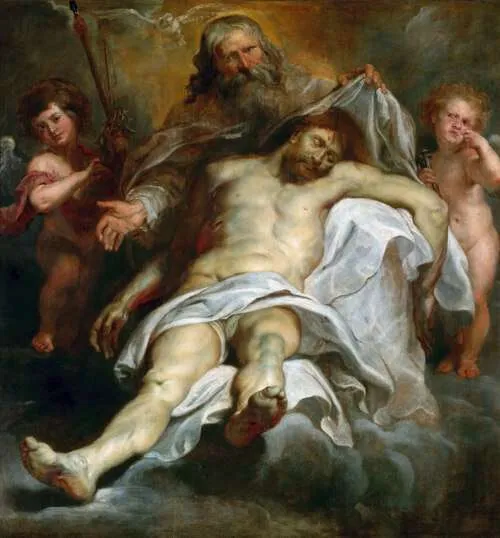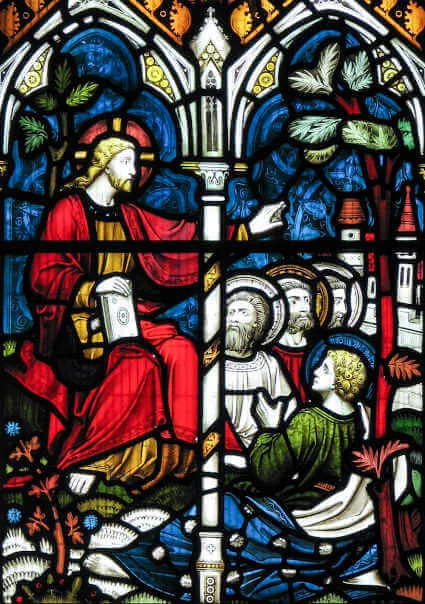First Century Patron Saint of baptism, bird dealers, converts, monastic life, motorways, printers, tailors, lambs, and prisoners; Invoked against epilepsy, convulsions, hailstorms, and spasms; Pre-Congregation canonization
At the time of Saint John the Baptist’s birth, it was commonly thought that a woman’s inability to conceive was a sign of God’s disfavor and a punishment for sin. Although we know that’s not the case, it’s important to understand that God often brought forth great leaders from those who had long begged God for a child. Sarah was barren before conceiving Isaac. Rebekah was barren before giving birth to Esau and Jacob. Rachel was barren before giving birth to Joseph. Manoah’s wife was barren until she gave birth to Samson. And Hannah was barren until she gave birth to Samuel. Today’s solemnity celebrates one of the greatest births in history. Recall that Jesus himself would later say, “Amen, I say to you, among those born of women there has been none greater than John the Baptist” (Matthew 11:11).
When Elizabeth conceived John the Baptist, she and her husband, Zechariah, “were advanced in years” (Luke 1:7). The announcement of the child’s birth came to Zechariah when he was chosen by lot from his priestly clan to enter the Temple sanctuary to burn incense to the Lord. This was among the highest honors of the Old Testament priests. While in the sanctuary, the Archangel Gabriel, who stands before God, appeared to him to announce the good news. Zechariah was told that his wife would not only conceive and bear a son, but that his son “will be great in the sight of the Lord…be filled with the Holy Spirit even from his mother’s womb…turn many of the children of Israel to the Lord…will go before him in the spirit and power of Elijah…turn the hearts of fathers toward children…to prepare a people fit for the Lord” (Luke 1:15–17). This announcement of the birth of Saint John the Baptist was not only a joyous announcement, it was almost beyond belief. Zechariah certainly would have been sorrowful throughout his marriage that he had no children, and now an Archangel was telling him that his soon-to-be-conceived child would be great beyond belief. Of course, we know that Zechariah did, at first, disbelieve and was struck mute until John was born.
The next glorious chapter in the story of Saint John the Baptist came when that same Archangel, Gabriel, appeared to Mary, the Immaculate Conception, and announced that she would conceive the Savior of the World by the overshadowing of the Holy Spirit. After that announcement, Gabriel said to her, “And behold, Elizabeth, your relative, has also conceived a son in her old age, and this is the sixth month for her who was called barren; for nothing will be impossible for God” (Luke 1:36–37). This reveals the fact that, in the Father’s plan of salvation, John’s mission was intimately connected to that of Jesus. This is further confirmed when Mary travels in haste to her cousin Elizabeth to help her in the final months of her pregnancy. At the sound of Mary’s greeting, the unborn infant, John, leaped for joy in Elizabeth’s womb. Of this event, Saint Thomas Aquinas teaches that John was sanctified in the womb at that moment, meaning he was freed from sin and prepared for his sacred mission of preparing the way for Jesus’ ministry. Saint Thomas even goes so far as to speculate about that moment of sanctification as follows: “Perhaps also in this child the use of reason and will was so far accelerated that while in his mother’s womb he was able to acknowledge, believe, and consent, whereas in other children we have to wait for these things till they grow older: this again I count as a miraculous result of the divine power” (Summa Theologica 3.27.6).
John’s birth, which we celebrate today, was surrounded by mystery, amazement, awe, and intrigue. The reaction to John’s birth is recorded this way by Saint Luke: “Then fear came upon all their neighbors, and all these matters were discussed throughout the hill country of Judea. All who heard these things took them to heart, saying, ‘What, then, will this child be?’ For surely the hand of the Lord was with him” (Luke 1:65–66).
Other than the Solemnity of the Birth of Christ (Christmas), Saint John the Baptist is the only person whom the Church honors with a solemnity to celebrate his birth. Our Blessed Mother’s birth is celebrated with a feast, although her Immaculate Conception is commemorated with the greater honor of a solemnity. It is a great honor, indeed, to honor this unique man’s birth with the highest rank of celebration within our Church.
As we mark the birth of Saint John the Baptist, ponder this birthday from two perspectives. First, look at it from a Heavenly and eternal perspective. The angels and saints will forever glorify God for this great event and for the significant role that John played in the history of salvation. Second, look at it from a purely human perspective. Try to ponder the wonder and awe that would have enfolded Elizabeth and Zechariah. Consider their humanity. They were real people who became real parents and were told great things about their child. Despite that, John was still their child, just as Jesus was Mary’s Child. The proper perspective of every event we celebrate in salvation history is to unite the human and divine perspectives, the transcendent and the imminent, the personal and the supernatural, to more fully understand, participate in, and believe these glorious and historical events that have opened the gates of Heaven to all who have faith.
Source: https://mycatholic.life/saints/saints-of-the-liturgical-year/june-24—birth-of-saint-john-the-baptist/







